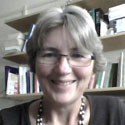Academic Editors
The following people constitute the Editorial Board of Academic Editors for PeerJ. These active academics are the Editors who seek peer reviewers, evaluate their responses, and make editorial decisions on each submission to the journal. Learn more about becoming an Editor.

Brian L Beatty
Dr. Brian Beatty is a comparative anatomist, paleobiologist at New York Institute of Technology. He is especially interested in convergent/unique evolution of aquatic amniotes to similar physiological constraints, as well as surface metrology and its relationship to underlying microstructure of bone, skin, and endothelia.

Violaine Sée
Violaine See completed her doctorate on progammed cell death signaling at the University of Strasbourg (France). After a post-doctoral position in Liverpool on NF-kappaB dynamics she obtained a Fellowship to work on intracellular signalling dynamics at the University of Liverpool. She now leads a research group focusing on cellular adaptation to low oxygen levels and the dynamics of hypoxia inducible factor using single cell imaging and advanced fluorescence microscopy

Corinne F Maurice
CIFAR Azrieli Global Scholar and Tier 2 Canada Research Chair in Gut Microbial Physiology in the Department of Microbiology and Immunology at McGill University. Board member of the Microbiome and Disease Tolerance Centre.
Research in our lab aims to address two major goals:
* Identify and characterize the metabolically active microbial members of the gut microbiota.
* Determine the role of bacteriophages as regulators of the active gut microbiota.


Ewa J. Mellerowicz
Professor in plant cell and molecular biology at the Department of Forest Genetics and Plant Physiology, Swedish University of Agricultural Sciences, Umea Plant Science Center.

Sarah Samadi
Sarah Samadi is professor at the Museum National d'Histoire Naturelle in Paris. The common background of all her scientific activities is the analysis of the conceptual grounds of systematics and evolutionary biology. Her present empirical projects are mainly in the fields of species delimitations and of speciation processes. Most of her projects are focusing on organisms from poorly known environments (mainly deep-sea environments, notably seamounts and organic remains sunken on the deep-sea floor) and are developed in the methodological framework of “Integrative Taxonomy”, in which methods in phylogenetics, population genetics and ecology are combined.

Ebba Brakenhielm
INSERM Tenured Researcher in the field of Cardiovascular Research, currently focusing on therapeutic angiogenesis with polymer-based targeted growth factor delivery.
PhD in Tumor Biology (Pr Yihai Cao, Karolinska Institutet, Sweden), and expertise in Adipose tissue angiogenesis. Postdoc at UCLA (Pr Lily Wu) in molecular imaging and tumor lymphangiogenesis field.
Member of European Vascular Biology Organisation, French society for Cardiovascular Research, French society for Angiogenesis Research.

Jeremiah J Gassensmith
Jeremiah's research focuses on several areas:
Development of stimuli responsive "smart" biomaterials
Creating new thermosalient molecular crystalline materials
Using metal-organic frameworks for native protein (i.e. drug) delivery
Supramolecular and macromolecular organic radical contrast agents as MRI sensors

Joana C Silva
My group applies evolutionary genetics and genomic sciences to basic research on species evolution and translational research of infectious diseases. I have been studying infectious disease genomics since the early 2000's. At The Institute for Genomic Research (TIGR) I was part of the team that launched the field of parasite genomics, with work on several Plasmodium and trypanosomatid species, Theileria parva and Trichomonas vaginalis. At the Institute for Genome Sciences, University of Maryland School of Medicine, we have ongoing projects on a variety of parasites in the phylum Apicomplexa. These include the causative agents of malaria in humans (genus Plasmodium), tropical theileriosis and East Coast fever in cattle (genus Theileria), human babesiosis (genus Babesia), and human cryptosporidiosis (genus Cryptosporidium). Ongoing projects include the study of species biology and the nature of host-parasite interactions, based on the generation and analyses of genomes, and studies of vaccine efficacy and vaccine design, drug resistance and the evolution of parasite populations, informed by population genomics data. Our research is funded by NSF, NIH, USDA and the Bill and Melinda Gates Foundation.

Fabrizio Sors
Dr. Fabrizio Sors is an Assistant Professor in General Psychology at the University of Trieste. His research activity is mainly focused on perceptual-cognitive processes, both at a basic level and applied to various fields, primarily to sports.

Daisuke Koyabu
Dai Koyabu is an Associate Professor of Anatomy at the City University of Hong Kong. He was educated at Kyoto University, University of California at Berkeley, and University of Tokyo, and had postdoctoral training at University of Zurich. His research focuses on the anatomy, evolution and development of the mammalian cranium. Editorial Board of Mammalian Biology, Mammal Study, and Morphomuseum. Recommender for PCI Paleontology. Executive Committee Member of the International Society of Vertebrate Morphology (ISVM).

Raymond Niaura
Director of Science at the Schroeder Institute, and Adjunct Professor, Department of Health, Behavior and Society in The Johns Hopkins Bloomberg School of Public Health. Past President of the Society for Research on Nicotine & Tobacco; Fellow of the American Psychological Association, the Society for Behavioral Medicine, and the American Academy of Health Behavior.

